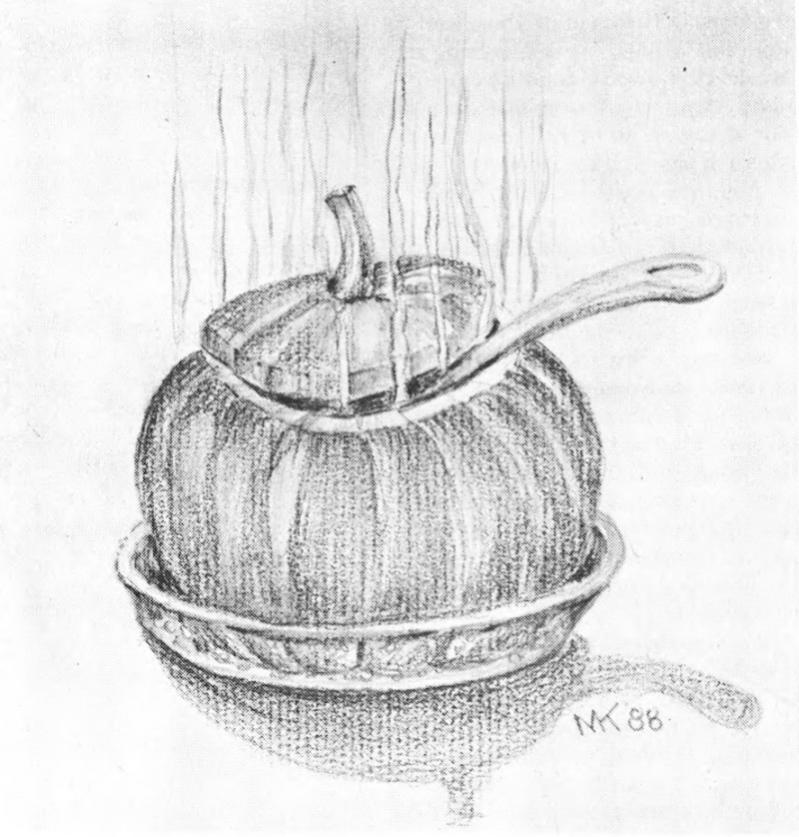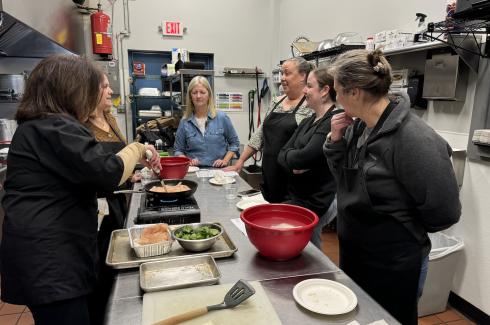Most of the pumpkins dotting the fields with the brilliant orange will get their 15 minutes of celebrity on Halloween night. For although this hardy member of the squash-gourd family grows ubiquitously both in this hemisphere and in Europe, there are few recipes for its use. Too bad, because the pumpkin’s hard rind keeps it usable for many months past the Thanksgiving pie season. I think the beautiful pumpkin was more important in the diet in the last century, most certainly in peasant communities of Britain and Europe. Consider this passage from the 1867 edition of “The First Principles of Good Cookery,” by Lady Llanover of Wales.
"In Gower (South Wales) they are added to hashed meat, made into pies with apples, and put into soup. Pumpkins have one peculiar quality in addition to a good deal of natural sweetness: They will absorb and retain the flavor of whatever they are cooked with. If stewed with plums it tastes exactly like them in puddings and tarts; the same with apples, rhubarb, or gooseberries; and for savory cookery it would be difficult to say in what dish it may not be used with advantage."
In France and Germany pumpkin is treated solely as a vegetable and made into richly flavored casseroles and soups. The following recipe for pumpkin soup is from a landmark piece of food scholarship by the British food writer Elizabeth Luard that has recently been published by Bantam in this country. It is titled "The Old World Kitchen" and covers traditional peasant cooking from all over Europe.
Welsh Pumpkin Soup
Like Chinese winter melon soup, this potion is cooked very slowly in its own shell and served from it at table. A little tricky — the self-tureen mustn't collapse — but a fun project for some lazy autumn day. Serves four to six.
1 whole pumpkin, 8 to 12 inches in diameter
3 to 4 cups half-and-half
1/2 tsp. salt
Pepper
Bread cubes for croutons
Preheat the oven to 300 degrees Fahrenheit. You will need an oven-to-table baking dish and a ricer or a blender (or processor).
Cut off a lid from the stalk end of the pumpkin. Scoop out the pith and the seeds. Put the pumpkin in the baking dish. Fill the hollow with the half-and-half (the liquid shouldn’t come more than two thirds up the pumpkin, so adjust the quantity according to the size of the hollow) making sure you have room for at least three cups. (Note: Measure with water first to make sure of the pumpkin's capacity.) Add the salt and give a few turns of the pepper mill.
Replace the lid on the pumpkin, and then put it in a low oven to bake. A medium-sized pumpkin takes three hours at 300 degrees F. At the end of that time, the pumpkin flesh will be soft and the skin will still be whole — though somewhat collapsed and fragile. (Note: Check after two hours, and every 15 minutes thereafter, so that you can guard against collapse.)
Scoop out the insides — liquid, flesh, and all — taking care not to puncture the pumpkin. Then either push the solids through a food mill or process everything in a blender. (Reheat the soup in a pot.) Return the soup to the pumpkin and carry it to the table. Pass hot croutons fried in butter.
Note: This recipe can be converted for a microwave oven, thus saving hours of cooking time. However, microwave ovens vary in wattage so radically it is difficult to recommend cooking times. You might try cooking the pumpkin soup at high in five-minute increments until it is tender.
Pumpkin Tea Bread
Pumpkin provides the moisture and density that makes this quickly-made loaf an excellent keeper, lovely with an afternoon cup of tea or coffee. Good for breakfast, too. Makes one eight-by-four-by-three-inch loaf.
1/2 cup pumpkin puree
5 Tbsp. unsalted butter
1 cup flour
1 cup yellow cornmeal
1 Tbsp. baking powder
1/2 tsp. baking soda
1 tsp. salt
1 large egg
1 cup milk
1/4 cup molasses
3/4 cup chopped walnuts or hazelnuts
Peel, seed, and cube a chunk of pumpkin weighing about one pound. Put the cubes into a steamer basket and steam about 20 minutes or until tender. Drain thoroughly and puree. Measure out a half-cup.
Grease a loaf pan. Cut a piece of wax paper to fit the bottom, plaster it down, and coat the paper with soft butter. Preheat the oven to 400 degrees F. Melt the butter gently and set aside. Sift into a mixing bowl the flour, cornmeal, baking powder, baking soda, and salt.
In another bowl, mix together the pumpkin puree and melted butter. Beat in the egg and then the milk and molasses. Stir in the nuts. Pour the pumpkin mixture over the dry ingredients and stir just enough to blend. Over-mixing will make this "quick-bread" tough.
Scrape the batter into the loaf pan and bake in the center of the oven for about 20 minutes or until the loaf cracks open on top and a toothpick inserted in the center comes out clean. Cool in the pan for 10 minutes, then invert, peel off the paper, and set the loaf right-side-up until completely cold. This slices best if wrapped in foil and kept at room temperature for a day before cutting. Un sliced and tightly wrapped, it will keep well for two weeks in the refrigerator.
Pepitas
Pumpkin seeds are a favored snack in Mexico. Only the kernels are eaten, the husk discarded. They can usually be bought in health food stores, but, if you're feeling ambitious, here's how to make use of all those seeds you have to scrape out of pumpkins, whether their destiny is jack o’lantern or culinary.
Wash the seeds in a colander and rub off the strings and pith. Dump them out on paper towels and blot them dry. Oil a pie plate or (if you have a lot of seeds) a jellyroll pan. Spread out the seeds on the pan and sprinkle them lightly with kosher salt. Bake in a 375-degree oven about 20 minutes. Cool. It's every man jack for himself when it comes to husking the seeds.





